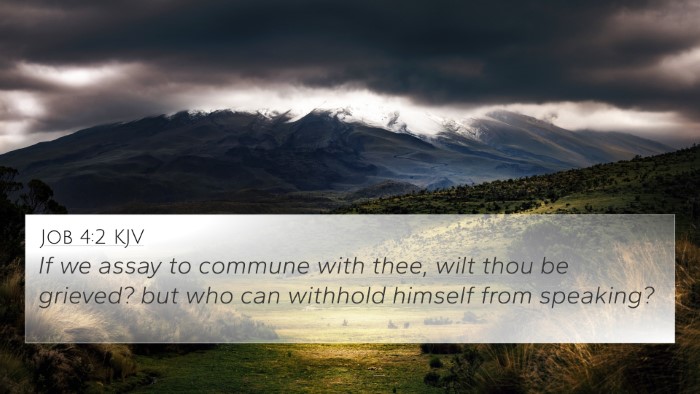Old Testament
Genesis Exodus Leviticus Numbers Deuteronomy Joshua Judges Ruth 1 Samuel 2 Samuel 1 Kings 2 Kings 1 Chronicles 2 Chronicles Ezra Nehemiah Esther Job Psalms Proverbs Ecclesiastes Song of Solomon Isaiah Jeremiah Lamentations Ezekiel Daniel Hosea Joel Amos Obadiah Jonah Micah Nahum Habakkuk Zephaniah Haggai Zechariah MalachiJob 29:9 Similar Verses
Job 29:9 Cross References
The princes refrained talking, and laid their hand on their mouth.
Uncover the Rich Themes and Topics of This Bible Verse
Listed below are the Bible themes associated with Job 29:9. We invite you to explore each theme to gain deeper insights into the Scriptures.
Job 29:9 Cross Reference Verses
This section features a detailed cross-reference designed to enrich your understanding of the Scriptures. Below, you will find carefully selected verses that echo the themes and teachings related to Job 29:9 KJV. Click on any image to explore detailed analyses of related Bible verses and uncover deeper theological insights.

Proverbs 10:19 (KJV) »
In the multitude of words there wanteth not sin: but he that refraineth his lips is wise.

Proverbs 30:32 (KJV) »
If thou hast done foolishly in lifting up thyself, or if thou hast thought evil, lay thine hand upon thy mouth.

James 1:19 (KJV) »
Wherefore, my beloved brethren, let every man be swift to hear, slow to speak, slow to wrath:

Judges 18:19 (KJV) »
And they said unto him, Hold thy peace, lay thine hand upon thy mouth, and go with us, and be to us a father and a priest: is it better for thee to be a priest unto the house of one man, or that thou be a priest unto a tribe and a family in Israel?

Job 7:11 (KJV) »
Therefore I will not refrain my mouth; I will speak in the anguish of my spirit; I will complain in the bitterness of my soul.

Job 4:2 (KJV) »
If we assay to commune with thee, wilt thou be grieved? but who can withhold himself from speaking?
Job 29:9 Verse Analysis and Similar Verses
Understanding Job 29:9
Job 29:9 states, "The princes refrained from talking, and laid their hand on their mouth." This verse reflects a time in Job’s life when he held a prominent position of respect and authority. The silence of the princes indicates the weight of Job's words and his high standing in society.
In this verse, Job reminisces about his past, when he was seen as a leader—his opinions carried weight, and he commanded great respect from those around him. This moment of reflection serves to showcase the transformation that has occurred in Job's life, as he now finds himself in a state of suffering and despair.
Commentary Insights
Matthew Henry
Matthew Henry emphasizes Job's former dignity and prominence among the leaders of his community. He notes that the princes' silence is indicative of Job's wisdom and integrity, suggesting that Job's presence commanded respect and awe. This commentary encourages readers to reflect on the importance of righteous living, which can result in a powerful reputation within one's community.
Albert Barnes
Albert Barnes focuses on the significance of the princes refraining from conversation. He interprets this as a sign of reverence not just for Job, but for the principles of justice and truth for which Job stood. It serves as a reminder that true authority is derived from moral character rather than mere social status.
Adam Clarke
Adam Clarke provides insight into the cultural context of the time. He describes how elders and leaders would often yield to those known for their wisdom and virtue. The action of laying a hand on the mouth signifies respect and acknowledgment of Job's former esteemed position. Clarke's interpretation invites consideration of societal values and the way they shift in response to personal circumstances.
Bible Cross-References
- Proverbs 17:27-28 - "He who has knowledge spares his words, and a man of understanding is of a calm spirit."
- James 1:19 - "Let every man be quick to hear, slow to speak, slow to anger."
- Job 30:1 - "But now those younger than I mock me; at whose hand I have held the mouth closed."
- Proverbs 18:21 - "Death and life are in the power of the tongue, and those who love it will eat its fruits."
- Isaiah 53:7 - "He was oppressed, and He was afflicted, yet He opened not His mouth."
- 1 Peter 2:23 - "When He was reviled, He did not revile in return; when He suffered, He did not threaten."
- Psalms 39:2 - "I was mute and silent; I held my peace to no avail, and my distress grew worse."
Connections and Thematic Reflections
This verse embodies key themes that resonate throughout Scripture: the balance of speech and silence, the respect earned through righteousness, and the profound impact of a person’s words in their community. The silence of the princes serves as a powerful reminder of the weight that wisdom carries.
Exploring Further
For those interested in cross-referencing Biblical texts and understanding the connections between Bible verses, tools such as a Bible concordance or a Bible cross-reference guide can be invaluable resources. By examining links between scriptures, one can gain greater insight into the overarching themes that are woven throughout the Bible, including the principles reflected in Job's story.
Application in Study
When studying Job 29:9 and its surrounding context, consider the emotional and spiritual dimensions of Job's experience. The cross-references provided can enhance your understanding of how Job's life reflects a broader theological dialogue within both the Old and New Testaments.
Conclusion
The implications of Job 29:9 extend beyond Job's narrative and serve to reinforce the significance of righteous living, the power of speech, and the reverence that is due to those who lead with integrity. Through cross-referencing and thematic analysis, we can uncover a multitude of connections that enrich our Biblical understanding.




